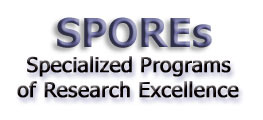

 |
 |
|||
 |
 |
 |
 |
 |
 |
 |
|
|
Vanderbilt University
To view the Vanderbilt Lung SPORE activities, please visit http://www.vicc.org/lungspore. OVERALL ABSTRACT The Lung Cancer SPORE application is submitted by the Vanderbilt-Ingram cancer Center and its affiliated institutions. In this proposal, we apply translational research strengths of the Vanderbilt-Ingram Cancer Center toward reducing the incidence, morbidity, and mortality of lung cancer, by focusing on the discovery and validation of molecular targets for prevention and therapy. In project 1 we are identifying biomarkers predictive of lung cancer in serum, bronchial biopsies, and fine needle aspirates of individuals at high risk of this disease. In project 2 we are applying sophisticated cDNA microarray and protein mass spectrometry techniques to the identification of molecular fingerprints of lung cancer. These fingerprints could ultimately be used to guide patient care or discover novel molecular targets for therapy. Project 3 studies a new potential molecular target, Notch3, that we identified by mapping a balanced chromosome translocation. This also represents a completely new mechanism for gene activation in lung cancer. In project 4, we have identified a novel survival pathway within tumor vascular endothelium that enhances the therapeutic effects of ionizing radiation. Projects 5 and 6 we investigate the role of cyclooxygenase 2 (COX2) in the therapy (project 5) and prevention (project 6) of lung cancer. The proposed career development and developmental research program are tightly integrated with established institutional initiatives with documented track records of identifying and funding promising projects and individuals. We will use these established mechanisms to fund lung cancer-targeted career development and research projects. We believe that these projects, cores, and pilot and career development awards could lead to major improvements in the prevention, diagnosis, and treatment of lung cancer.
Project 1 Project 1 Abstract: Lung cancer causes more deaths than breast, colon, pancreas and prostate cancer combined, yet there is a lack of a proven strategy for early detection. Deaths from lung cancer should be prevented through the detection and definitive treatment of preinvasive lesions and malignancies at a very early stage. The predominant hypothesis of this project is that early during their development, tumors develop molecular characteristics that one could identify before the invasive stage and that these specific determinants may be used as biomarkers for the early detection of lung cancer. We propose to take a proteomic approach using matrix assisted laser desorption ionization mass spectrometry (MALDI MS) to study the molecular determinants of tumor progression in the airways and in the serum of high risk individuals. Goal: To identify biomarkers predictive of lung cancer in serum, bronchial biopsies, and fine needle aspirates of individuals at high risk of this disease. Specific Aims of Project 1:
Project 4: "Receptor Tyrosine Kinase Inhibition and Radiation in Lung Tumor" Project 4 Abstract: VEGF is a growth factor produced by tumors and is involved in the development of blood vessels that feed tumors and provide a route for cancer cells to spread. There are a number of drugs that interfere with this process being studied. This includes an antibody that directly inhibits the action of VEGF. The first reported therapeutic test involving an anti-VEGF drug was conducted and reported in 2000 by a Vanderbilt-Ingram Cancer Center (VICC) researcher. The study showed that patients who took high doses of the anti-VEGF drug, along with chemotherapy, went almost twice as long without a recurrence of their lung cancer as compared to patients who did not use the drug or took a low dose. VEGF binds to the FIK-1 receptor to mediate different biological responses including endothelial survival and injury repair. VICC researchers suspect that FIK-1 mediated responses contribute to tumor blood vessel resistance. In vitro endothelial models have been established to study the mechanisms of interaction between FIK-1 antagonists and radiation. A significant preliminary finding is that FIK-1 antagonists improved tumor control rates of lung carcinoma tumor models as well as eliminated tumor vascular repair following irradiation. We have identified a novel survival pathway within tumor vascular endothelium that enhances the therapeutic effects of ionizing radiation. Considering that radiation therapy is the primary modality of treatment for unresectable lung carcinoma, improving the efficacy of this treatment is important to improving the cure rate of lung cancer patients. As a result, VICC researchers are collaborating with several pharmaceutical companies that are developing small compounds that inhibit specific enzymes within tumors. These compounds have entered or will enter clinical trials. These compounds inhibit receptor tyrosine kinases; enzymes that are required for the activation of growth factors for blood vessels that supply the tumor with nutrients and oxygen. These compounds will also enter clinical trials through the clinical core in this Lung Cancer SPORE. This project is investigating the mechanisms by which FIK-1 antagonists, a small synthesized compound, enhances the therapeutic effects of radiation using lung cancer models in mice. These compounds will then be developed at the pharmaceutical companies to enhance pharmacokinetics and minimize toxicity. The same approach will be taken with Akt inhibitors as they are developed. In conclusion, findings from the preclinical studies will assist in the design of Phase I and feasibility studies in the clinic through the clinical core of this SPORE. Additionally, the close collaboration with the pharmaceutical companies will ensure that the compounds are moved rapidly into clinical trials. |
|
|